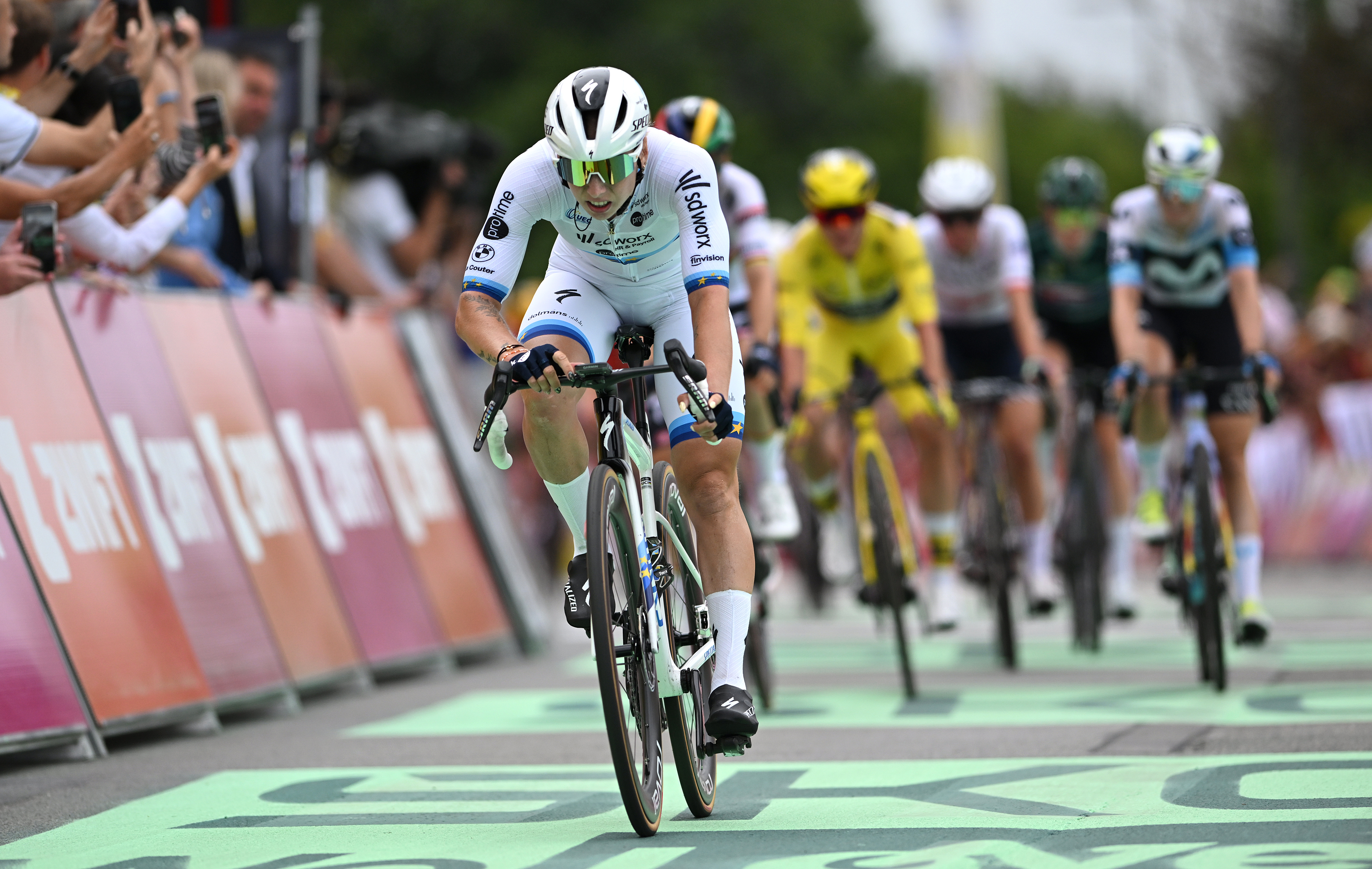'None of the teams were committed' - did the Tour de France Femmes peloton miscalculate the finish on stage 2?
After Mavi García's narrow solo victory, riders in the chase point the finger at each other


The gap was never very big. Tearing solo into Quimper on stage two of the Tour de France Femmes avec Zwift, Mavi García’s lead was only around 25 seconds at its largest, falling below 10 in the final drag up to the finishing straight. The road then flattened out, and her charge would surely be up. The peloton could see her, after all.
300m, 200m, 100m, but still the catch didn’t come. Sprinting out the saddle, a blur of white in her European champion’s kit, Lorena Wiebes burst across the line. She arrived three seconds too late.
It was, you might expect, another sour day for her SD Worx-Protime team. After missing out on the finale on day one, they’d missed the boat on stage two. But in a vast car park beyond the finish line, the mood by the team bus was one of smiles and high-fives.
“I think for people it’s strange that maybe I’m not super frustrated,” a smiling Wiebes told Cycling Weekly. “I was kind of free today to see how far I could come. We are never sure, and that’s why we didn’t really take the initiative to close the gap, [if we do that] then we waste energy for nothing. It was a bit of a gamble, but today, Mavi was stronger.”
With a steep kicker in the final kilometre, the course risked being too tough for a sprinter like Wiebes. Her plan, she said, was to “hang on” until the climbing stopped. When she made it up with the main group, the rest of the teams then felt the onus to chase fell to those with fast finishers.
“We were looking at Visma-Lease a Bike going for Marianne Vos in yellow, SD Worx with Wiebes,” explained Kasia Niewiadoma, last year’s Tour winner. “None of the teams were committed to bring [García] back. It was kind of like a stop-and-go pace.”
From Wiebes’s point of view, though, “the peloton could also do more”.
The latest race content, interviews, features, reviews and expert buying guides, direct to your inbox!
“If you doubt in the last 500m, and nobody is really pulling anymore – because probably they see me,” the SD Worx-Protime rider laughed, “then it’s also the fault of the peloton. That’s why I also think we as a team could not have done it.”
“You still hope that [García] maybe doesn’t have the legs anymore or something, but then I saw she would make it, and I was like, ‘Ok, it is what it is.’”
SD Worx-Protime manager Danny Stam watched the finale from the team car. What did he make of his team's second place? “Nice, nice,” he said. “We tried and we weren’t there. A finish like this is not a given case that it’s for a sprinter.
“When you come second, then you can say, ‘Ok, did you underestimate?’ But we just didn’t have the people to close it. Lotte [Kopecky] was dropped before, she came back, and then she directly started chasing.”
In the end, of course, the history books remember the winners. The coming stages three and four will bring flatter finishes, and Wiebes’s near miss could soon be forgotten in the swell of victory. For now, though, that joy lies with García, the bravest rider on the day, and now the oldest stage winner in Tour de France history.
“I didn’t expect to arrive,” the 41-year-old said an hour after her win, still astonished to have held off the pack. “I can’t believe it. I don’t know, I need more time. It’s been a long time since I felt this emotion.”

Tom joined Cycling Weekly as a news and features writer in the summer of 2022, having previously contributed as a freelancer. He is fluent in French and Spanish, and holds a master's degree in International Journalism. Since 2020, he has been the host of The TT Podcast, offering race analysis and rider interviews.
An enthusiastic cyclist himself, Tom likes it most when the road goes uphill, and actively seeks out double-figure gradients on his rides. His best result is 28th in a hill-climb competition, albeit out of 40 entrants.
You must confirm your public display name before commenting
Please logout and then login again, you will then be prompted to enter your display name.